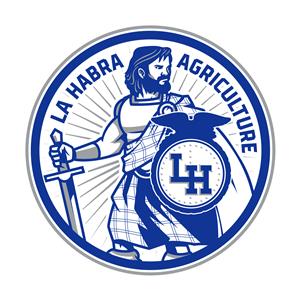- La Habra High School
- AGRICULTURE (Mechanics & Agriscience Pathways)
Academies & Programs
Page Navigation
- AGRICULTURE (Mechanics & Agriscience Pathways)
- Advanced Placement (AP)
- Forensics Police and Fire Academy (FPFA)
- Heritage Humanities California Magnet Program
- HiARTS - Visual & Performing Arts Programs
- HiSTEP
- Link Crew
- Marketing and Business Academy (MBA)
- NJROTC
- Regional Occupational Program (ROP)
- Dual-Enrollment Academy
Agriculture
-
Agriculture at La Habra High School offers students a hands-on approach to California's leading industry through classroom instruction, raising animals, gardening and other projects. The Academy of Agri-Science students must enroll in one or more Agriculture courses each year, be active participants in Future Farmers of America, and must complete a Supervised Agriculture Experience (SAE). An SAE may be raising and showing animals, constructing an agricultural mechanics project, raising plants, or completing a science fair project.
With both a school farm and an FFA [Future Farmers of America] chapter, students not only raise animals and plants and construct projects, they may also enter school projects in FFA competition. FFA is the largest youth organization in the world; it fosters an interest in agriculture and teaches leadership skills. La Habra FFA is one of the most nationally recognized chapters in this fine organization.
Contact Us
-
Jeremy McDermott
Department Chair
jmcdermott@fjuhsd.org
"Learning to Do, Doing to Learn, Earning to Live, Living to Serve"
-
THE NATIONAL FFA ORGANIZATION
Agriculture Education
The FFA Mission Statement: The National FFA Organization is dedicated to making a positive difference in the lives of students by developing their potential for premier leadership, personal growth and career success through agricultural education.
FFA & Agricultural Education
FFA members are part of a total agricultural education program that connects students to exciting careers in the science, business and technology of agriculture. FFA is only one of the three essential components of this system, all of which work together to provide members with leadership, academic and career experiences essential for success.
FFA is a dynamic youth organization that is a part of agricultural education programs at middle and high schools. Founded as the Future Farmers of America, the name was changed in 1998 to reflect the growing diversity of agriculture. Today, student members are engaged in a wide range of curriculum and FFA activities, leading to over 300 career opportunities in agriculture. FFA is structured on three levels: local, state and national.
The FFA Motto
Learning to Do, Doing to Learn, Earning to Live, Living to Serve.
Science, Business and Technology
The organization changed its name in 1988 from Future Farmers of America to the National FFA Organization to reflect its evolution in response to expanded agricultural opportunities encompassing science, business and technology in addition to production farming. FFA members, who may enter the workforce directly from high school or pursue higher degrees through technical schools and four-year universities, are preparing for careers in agricultural marketing, processing, communications, education, horticulture, production, natural resources, forestry, agribusiness and other diverse agricultural fields.
Membership
The FFA membership of 506,199 and 7,429 chapters represents all 50 states, as well as Puerto Rico and the Virgin Islands. FFA is a diverse organization, operating in rural, urban and suburban schools. Students aged 12-21 enrolled in agricultural education programs are eligible for membership.
Programs and Activities
Local, state and national FFA programs and activities help members develop public speaking skills, conduct and participate in meetings, manage financial matters, strengthen problem-solving abilities and assume civic responsibilities. Degrees earned at local, state and national levels recognize members' increasing accomplishments. The agriculture teachers deliver an innovative, cutting-edge and integrated curriculum to students.
Student Leadership
FFA members elect their own officers and plan and conduct activities with supervision from their chapter advisors. A team of six national officers, typically college students taking a year out of their studies, plays a key role in planning the national convention and other events, traveling more than 100,000 miles during their year of service representing FFA.
Career Exploration and Preparation
The agricultural education program provides a well-rounded, practical approach to learning through three components: classroom education in agricultural topics such as plant and animal sciences, horticulture, forestry, agrimarketing, etc.; hands-on supervised agricultural experience (SAE) such as starting a business or working for an established company; and FFA, which provides leadership opportunities and tests students' agricultural skills.- FFA members participate in hands-on work experiences, allowing them to apply knowledge learned in class.
- Collectively, FFA members earn $4 billion annually through their hands-on work experiences.
- Members participate in and learn advanced career skills in 47 national proficiency areas based on their hands-on work experiences ranging from food science and technology to agricultural communications to wildlife management to production agriculture.
- FFA members participate in hands-on work experiences, allowing them to apply knowledge learned in class.



